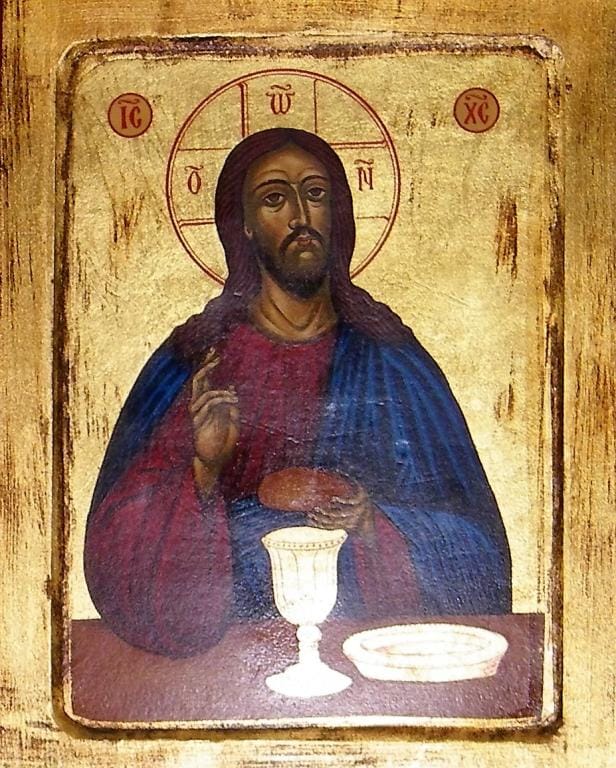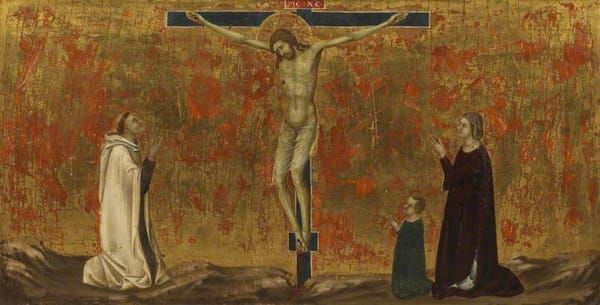What's the point of being Christian?

My online friend, Maurice Mo Hagar II, recently passed a question along to me and several others. He first pointed to this example:
If universal salvation is true, what’s the point of being Christian, of believing in Christ, getting baptized, belonging to the church… preaching the gospel, teaching the Bible, sending missionaries, and planting the church around the world? [From “Universalism And The Church: The Biblical-Christian Hope for Universal Salvation Revisited” by Carl E. Braaten in the Lutheran Forum (Summer 2020).]
Maurice then added:
Anybody know of a good resource on the ecclesiastical implications of universal redemption—pastoral ministry, sacraments, ‘baptism for the remission of sins,’ life, work, mission, witness, etc.? This is a FAQ. Universalism’s antithesis has significant implications for, and may even be grounded in, ecclesiology. But I don’t think I’ve seen this adequately addressed. Maybe one of you should write the book?
I’m not about to write a book about this, but here are a few quick reflections to what is indeed a FAQ. I’d note three things:
- When sharing and teaching the gospel, we need to start with what humans are going to do eternally instead of starting with what we are saved from in our current condition.
- Only after we appreciate the eternal goodness and blessing of the gospel, does it then make sense to speak about the current mess from which we need to be saved.
- Last of all, the point needs to be made clear that we participate directly now, moment by moment, in both the goodness of eternal life and the working out of our own salvation.
First, we are made to participate together with all of creation in the infinitely creative and beautiful life of God. We each have infinite options within this divine life together. Therefore, even when we are fully open to this divine love and perfectly united to it, we will never cease to experience endless growth together within the timeless life of God. This is the doctrine of epektasis (perpetual stretching, striving, growth, or ascent) as referenced in Philippians 3:13 and first developed extensively by Saint Gregory of Nyssa. Gregory rejected any notion that perfection means sameness or that change is always a sign of weakness. Gregory saw perfection in terms of constant progress in theosis so that our lives in union with God must mean that our capacity to be satisfied is itself forever increasing. C. S. Lewis hints at this in a passage from The Four Loves:
Friendship exhibits a glorious ‘nearness by resemblance’ to heaven itself where the very multitude of the blessed (which no man can number) increases the fruition which each of us has of God. For every soul, seeing Him in her own way, doubtless communicates that unique vision to all the rest. That, says an old author, is why the Seraphim in Isaiah’s vision are crying ‘Holy, Holy, Holy’ to one another (Isaiah 6:3). The more we thus share the Heavenly Bread between us, the more we shall have.
When Lewis speaks of “the Heavenly Bread” of which we share more and more, Lewis is talking about eternal Eucharist of which we partake even now. Alexander Schmemann writes of this in For the Life of the World (which Rowan Williams named by its original title The World as Sacrament when he called it “one of the most important theological texts I’ve read in my life”):
The new food of the new life which we receive from God in His Kingdom is Christ Himself. He is our bread – because from the very beginning all our hunger was a hunger for Him and all our bread was but a symbol of Him, a symbol that had to become reality. …The Eucharist …is the sacrament of unity and the moment of truth: here we see the world in Christ, as it really is, and not from our particular and therefore limited and partial points of view. …All exists to make God known to man, to make man’s life communion with God.
We can read about this in many places of course. Hans Urs von Balthasar writes of this in Cosmic Liturgy: The Universe According to Maximus the Confessor and Hans Boersma also does in Heavenly Participation: The Weaving of a Sacramental Tapestry.
However, moving to my second point, Christians are all guilty of failing to make it clear just what this means for both our current and our eternal purpose as participants in God’s eternal creation. We have not only failed to explain what worship, prayer, repentance, liturgy, sacrament, baptism, and Eucharist are all about. We have spread witless and horrific lies about them all. Most people today think that we repent and pray for mercy and turn to baptism and the Eucharist because we need to be saved from hell and allowed into heaven after we die. Worse yet, the most widespread concept regarding why we need to be saved is that we have a legal guilt (our own and that of our ancestors) that God must deal with by the punishment of Jesus Christ in our place. This entire picture involving legal guilt is a profound deception.
We have forgotten that Eucharist means thanksgiving, and that our problem is not a collective legal guilt but a collective sickness, ignorance, and inability. We do not know how to receive good gifts from our loving Father and to give thanks in return. We go to church and participate in the Eucharist so that we can learn to see goodness and beauty again all around us, so that we can learn to forgive ourselves and others, so that we can gain the strength to stand up to injustice and oppose it, so that we can regain soft hearts capable of receiving love and expanding with gratitude.
Furthermore, we are not going to church so that we can learn to wait patiently for an eternal life that will come to us in the future. We are not longing to escape from this world. As David Bentley Hart said in an interview with Steven HAuse (posted to Love Unrelenting on October 15, 2021):
The Bible doesn’t give you imagery of some other place than this world. In the Old Testament, the New Testament, in the Prophets, in Paul—the only image of salvation that there is, is cosmic. It’s always not just human beings praising God but all the animals of the land and the sea. It’s a restored creation. …There is no notion of going to some ethereal heaven apart from the rest of creation. The imagery is of a renewed world, a renewed cosmos in which everything—mineral, vegetable, animal, human—is present. The ground of all nature is personal presence. That’s more original than everything else.
…Those who have owned a dog know who that dog is—unlike every other dog in many ways—that he or she has little idiosyncrasies or habits …you know if this dog is excessively timid. You are, in all of nature, always confronted with a kind of personal presence. I tend to think that here [Sergei] Bulgakov is right: all of nature, all of creation, is in its inmost essence always already personal. Its destiny can’t be the destiny of a machine that merely collapses into dust at the end of its utility. Apokatastasis literally means restoration of all things, and all things would seem to include all things.
In his book The Doors of the Sea, David Bentley Hart writes about this vision that we must learn to have:
The Christian should see two realities at once—one world, as it were, within another. One, the world as we all know it, in all its beauty and terror, grandeur and dreariness, delight and anguish, and the other, the world in its first and ultimate truth, not simply nature but creation, an endless sea of glory radiant with the beauty of God in every part, innocent of all violence. To see in this way is to rejoice and mourn at once, to regard the world as a mirror of infinite beauty but as glimpsed through the veil of death. It is to see creation in chains but beautiful as in the beginning of days.
…Whether or not one believes in such glory or has faith in its final advent or can in fact see it even now through the veil of death and our estrangement from God (though I suspect that all of us see it at times whether our internal dispositions permit us to recognize what we see or not), one should be able to grasp that it is not a glory immediately revealed in cosmic or human history but is rather one that appears before, alongside, within and beyond that history, always present yet also for now deferred and so visible to us only through a glass darkly. This glory is not simply the hidden rationality of history but a contrary history that pervades and that will finally overwhelm the world of our fallenness. It is not the sublime or sacred logic of nature but what shines through the promise of nature’s loveliness, a beauty of which nature as we now know it is only a spectral remnant or a delightful foretaste.
We go to church and pray so that we can learn to receive all of the material world as God’s presence with us all, so that “matter becomes again means of communion with and knowledge of God” as Schmemann says (For the Life of the World).
When our bodies do die, we are promised transfigured and spiritual bodies in the general resurrection, but there is no clarity regarding when and how this all takes place in relation to time as we currently experience it now in our fleshly existence. We may very well have much yet to learn even after we have lived out the lives of our fleshly bodies and died. This is one reason to take seriously the opportunities that we have to start learning during our current lifetimes. We should primarily be motivated by the enjoyment of creation and each other as God’s own blessed presence with us moment by moment even now in this lifetime. However, if these higher and lasting motivations don’t capture us now, we should legitimately also fear the pains of dying in ignorance, blindness, and incapacity. Our purgation and training after the death of our bodies may indeed be a literal hell, and we have every reason to warn others and to remind ourselves regularly of this threat.
In the third and final point, we need to make it clear that both the beginning of our participation in eternal life now, moment by moment, as well as the current outworking of our own salvation are undertakings in which we must labor and participate in order for them to be achieved. God’s calling of us to colabor with him is not optional or metaphorical but required and literal. Therefore, we are responsible to labor creatively and synergistically with God in each moment to begin making all things new. When we learn to work with God in the realm of eternity that connects to every moment of this fallen history, we are actually working with God in a more complete, deeper, and more interconnected form of time. We can actually begin to make the past itself whole and good again by our attention and care in each current moment. God’s eternity with us inside of each moment takes up all of time as we know it and connects directly to every moment of time so that we are participating in a realm where all things are made new.
As George MacDonald says in Lilith:
Annihilation itself is no death to evil. Only good where evil was, is evil dead. An evil thing must live with its evil until it chooses to be good. That alone is the slaying of evil.
Or as he says in his Unspoken Sermons (on “Justice”):
To suffer to all eternity could not make up for one unjust word. …Sorrow and confession and self-abasing love will make up for the evil word; suffering will not. …The only vengeance worth having on sin is to make the sinner himself its executioner. …Sin and suffering are not natural opposites; the opposite of evil is good, not suffering; the opposite of sin is not suffering, but righteousness.
Such thinking is beautifully communicated throughout the works of George MacDonald. Consider also his Unspoken Sermons titled “The Last Farthing” and “The Consuming Fire” especially.
To recap, then, we go to church and bless holy water together so that it might be “revealed as the true, full, adequate water” and we might learn to see the whole world as it truly exists where all things are a direct “means of communion with and knowledge of God” (Schmemann, For the Life of the World).
Being a Christian and going to church is not about separating ourselves from creation but about learning to enter more fully into every moment and part of creation. As Gregory of Nyssa wrote in his Catechetical Oraciones (36):
When every created being is at harmony with itself …and every tongue shall confess that Jesus Christ is Lord, …every creature shall have been made one body …Now the body of Christ, as I have often said, is the whole of humanity.
Or as the contemporary theologian Fr. John Behr has said here:
The Church is the whole of creation seen eschatologically; from which we already see islands in the present, called out from ‘the world’ (in the negative sense).
Our calling is to grow eternally in creative communion and life with God and all others, and this calling begins now, in each moment. We are currently very feeble and incapable of this, and we do far more damage than good in our current blindness, pain, and confusion together. Nonetheless, all of this good work starts now in full reality but continues after the death of our fleshly body in various ways that we cannot fully picture or imagine in our current condition. Being part of the church and its sacramental life is learning to be truly and completely a part of the natural and created world. It is a natural human endeavor that connects us more and more fully to all other humans and to the rest of the world. All of human life has this capacity to bless us, and all other faith traditions bring strengths and insights that can help Christians to better see and follow Jesus Christ. There is no legitimate reason to fear that faithfulness to the church to the practices of a Christian life should separate us from others. Of course, many abuses of the church can cause separation and strife, but as we follow Christ, even these abuses within the earthly church do not need to hurt and control us. Our true Christian calling is deeper and higher and capable of love and thanksgiving for all that surrounds us.





